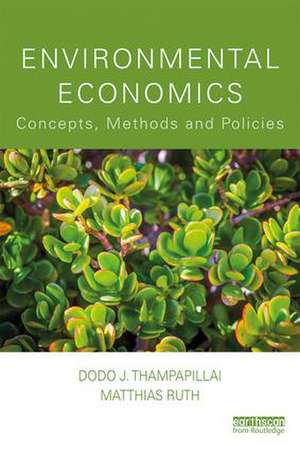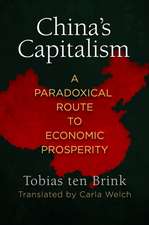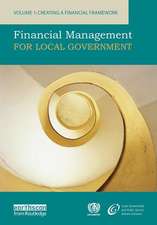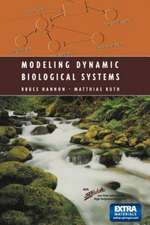Environmental Economics: Concepts, Methods and Policies
Autor Dodo J. Thampapillai, Matthias Ruthen Limba Engleză Paperback – 28 mai 2019
Environmental Economics explores the ways in which economic theory and its applications, as practised and taught today, must be modified to explicitly accommodate the goal of sustainability and the vital role played by environmental capital.
Pivoting around the first and second laws of thermodynamics, as well as the principles of ecological resilience, this book is divided into five key parts, which includes extensive coverage of environmental microeconomics and macroeconomics. It drills down into issues and challenges including consumer demand; production and supply; market organisation; renewable and non-renewable resources; environmental valuation; macroeconomic stabilisation, and international trade and globalisation. Drawing on case studies from forestry, water, soil, air quality and mining, this book will equip readers with skills that enable the analyses of environmental and economic policy issues with a specific focus on the sustainability of the economy.
Rich in pedagogical features including key concepts boxes and review questions at the end of each chapter, this book will be a vital resource for upper-level undergraduate and postgraduate students studying not only environmental economics/ecological economics but also economics in general.
| Toate formatele și edițiile | Preț | Express |
|---|---|---|
| Paperback (2) | 282.14 lei 3-5 săpt. | +25.81 lei 4-10 zile |
| Taylor & Francis – 27 noi 2024 | 282.14 lei 3-5 săpt. | +25.81 lei 4-10 zile |
| Taylor & Francis – 28 mai 2019 | 387.49 lei 3-5 săpt. | +25.24 lei 4-10 zile |
| Hardback (2) | 1000.27 lei 6-8 săpt. | |
| Taylor & Francis – 29 mai 2019 | 1000.27 lei 6-8 săpt. | |
| Taylor & Francis – 27 noi 2024 | 1009.28 lei 6-8 săpt. |
Preț: 387.49 lei
Nou
74.15€ • 80.52$ • 62.29£
Carte disponibilă
Livrare economică 01-15 aprilie
Livrare express 15-21 martie pentru 35.23 lei
Specificații
ISBN-10: 1138060054
Pagini: 342
Ilustrații: 18 Tables, black and white; 94 Line drawings, black and white; 94 Illustrations, black and white
Dimensiuni: 156 x 234 x 25 mm
Greutate: 0.52 kg
Ediția:1
Editura: Taylor & Francis
Colecția Routledge
Locul publicării:Oxford, United Kingdom
Public țintă
Postgraduate and UndergraduateCuprins
Notă biografică
Matthias Ruth is Vice-President (Research) and Professor of Economics at the University of Alberta, Canada. He has also held senior appointments in Geography, Civil and Environmental Engineering, and Public Policy and Urban Affairs at universities in the United States. His research covers the full spectrum from local to regional, to national and global environmental challenges, as well as the investment and policy opportunities these challenges present. He is a founder of Ecological Economics and founding Editor-in-Chief of the journal Urban Climate, serves on the boards of numerous journals and scientific organisations, and collaborates extensively with scientists and policy-makers worldwide.
Recenzii
"At last an economics textbook that acknowledges that the basis of an economy is the environment. The potential role of economics in addressing many of the environmental issues facing our planet, especially climate change, has been hampered by the incomplete nature of the basic tenets of neo-classical economics. This book corrects that problem and will provide students with the tools to make much sharper contributions to current policy debates. It is an ideal textbook for any serious environmental economics course." -- Peter Phibbs, Department of Urban and Regional Planning Director, Henry Halloran Trust, University of Sydney, Australia
Descriere
Environmental Economics explores the ways in which economic theory and its applications, as practised and taught today, must be modified to explicitly accommodate the goal of sustainability and the vital role played by environmental capital.
Pivoting around the first and second laws of thermodynamics, as well as the principles of ecological resilience, this book is divided into five key parts, which includes extensive coverage of environmental microeconomics and macroeconomics. It drills down into issues and challenges including consumer demand; production and supply; market organisation; renewable and non-renewable resources; environmental valuation; macroeconomic stabilisation, and international trade and globalisation. Drawing on case studies from forestry, water, soil, air quality and mining, this book will equip readers with skills that enable the analyses of environmental and economic policy issues with a specific focus on the sustainability of the economy.
Rich in pedagogical features including key concepts boxes and review questions at the end of each chapter, this book will be a vital resource for upper-level undergraduate and postgraduate students studying not only environmental economics/ecological economics but also economics in general.












